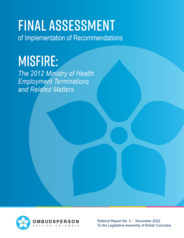The Ombudsperson British Columbia (BC) released the final investigative update to his office’s 2017 report Misfire: The 2012 Ministry of Health Employment Terminations and Related Matters. The update concludes that all of the report’s 41 recommendations to the provincial government are now implemented.
The update follows the Ombudsperson’s 2018 Interim Assessment report on government’s implementation of the recommendations in Misfire. That update found that all but four of the report’s recommendations had been fully implemented. It highlights that the four outstanding recommendations, that focus on financial settlements for impacted employees and improvements to workplace culture at the Ministry of Health, have now been implemented.
“After five years of monitoring the implementation of the report’s recommendations, I am satisfied, based on the evidence my office has received, that the government has done what it committed to immediately after we released the report in 2017,” said Ombudsperson Jay Chalke, adding that his office monitors the implementation of all accepted recommendations it makes in public reports for approximately five years after a report is released. “Monitoring the implementation of our recommendations is a fundamental tool we use to ensure government accountability. We don’t just make recommendations and walk away, we track progress and collect evidence to ensure government has actually done what it committed to do. And in this case, I am satisfied it has.”
The Misfire report was the result of the first time in the Ombudsperson’s history that the Legislature referred an investigation to the office, which resulted in the most resource-intensive investigation in the 43-year history of the office. After receiving over 4 million records and interviewing 130 witnesses, the investigation found that an initial concern raised by an employee incorrectly suggested internal wrongdoing that gained momentum without proper assessment or investigation. The Ombudsperson found that government had acted wrongly in, among other things, firing seven Ministry of Health employees, suspending or terminating contracts and access to health data, and announcing that the fired employees were the subject of an RCMP investigation. One former employee tragically lost his life to suicide.
Misfire made 41 recommendations focused on individual redress and systemic changes, resulting in a range of outcomes including:
- Apologies and ex gratia payments were made to employees and contractors who were impacted;
- A University of Victoria scholarship was established in memory of deceased former employee Roderick MacIsaac;
- New policies were developed relating to a number of areas including employee conflict of interest, improved accountability for, and oversight of, internal human resources investigations, new guidelines for suspending access to health data and a new procedure for deciding whether to report employee conduct to the police;
- Two new pieces of legislation were passed in the Legislature in 2018. The Public Interest Disclosure Act protects public sector employees who disclose workplace wrongdoing and establishes a legal framework to conduct the resulting investigations. In addition, amendments to the Public Service Act now require the provincial government’s just cause dismissals to be regularly reviewed by the Merit Commissioner to provide independent assurance that government complies with the applicable law and policy;
- The Ministry of Health developed and implemented a strategy to improve workplace culture within the ministry.
“I am encouraged that in response to our final update, the former Head of the Public Service committed to applying the lessons learned from this unfortunate chapter in B.C. history to strengthen the ethical culture, integrity and accountability of the public service,” said Chalke. “While this marks the end of the monitoring process of this investigation for my office, we should all remember that the lasting impacts of the events described in our 2017 report will continue for those who were personally and professionally impacted.”
To view the full report, please visit the BC Ombudsperson’s website or consult the download section below.
Source: Office of the Britsh Columbia Ombudsperson, Canada

